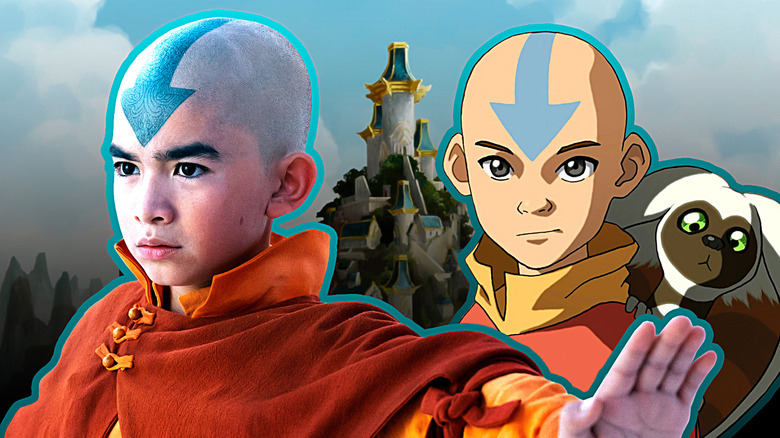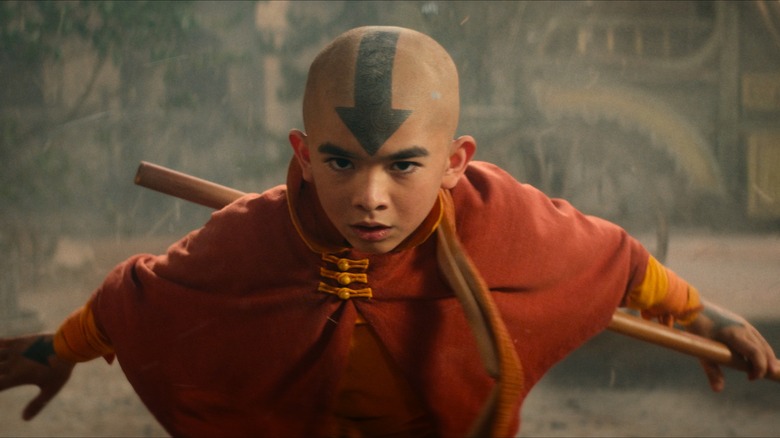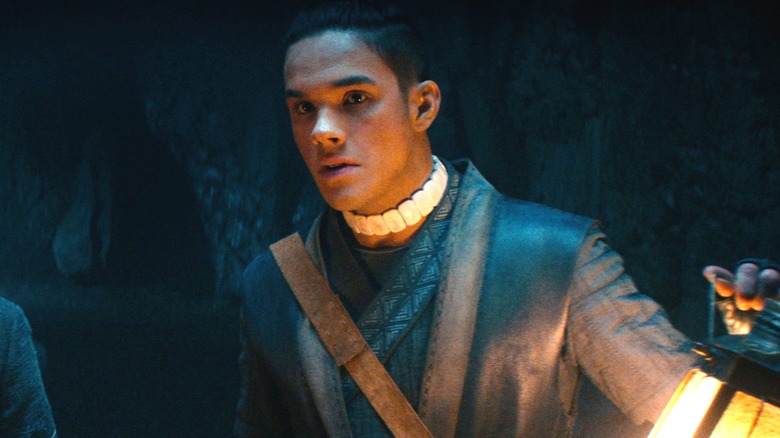Netflix's Avatar: The Last Airbender Shows A Devastating Scene The Animated Series Couldn't
While Netflix's live-action reboot of "Avatar: The Last Airbender" may be a nostalgic throwback for fans of the classic Nickelodeon series, much of the buzz surrounding the project concerns how it adapts and reimagines the source material. Even if the core story beats and lore are generally kept intact, this new version contains some pretty major revisions from the original "Avatar: The Last Airbender," such as the temporal element of Aang and his friends' journey. However, arguably one of the biggest changes of all comes with the reboot's depiction of a key event from the original series — a scene that was never animated because of how dark it is.
In an interview with Entertainment Weekly, "Avatar: The Last Airbender" showrunner Albert Kim revealed that the new series will depict the Fire Nation's genocide of the Air Nomad people on-screen. Not only that, but this tragic scene will serve as the opener of the series. The Air Nomad genocide is one of the most important events from the world of the animated series, highlighting the villainy of the Fire Nation and serving as the backstory for Aang's status as the last of his people. Nonetheless, the actual event itself was only ever referenced and not shown.
According to Kim, the inclusion of this harrowing event was a point of priority for him and the team. "I felt it was important that we see the event that creates the story of 'Avatar,'" he explained. "The famous line is, 'Everything changed when the Fire Nation attacked.' I wanted to see that."
The team wanted to set their Avatar adaptation apart
Netflix's "Avatar: The Last Airbender" opening with the events of the Air Nomad genocide is a pretty major shift for the new series, but it wasn't just done out of the creative team's desire to realize this key plot point on-screen. Throughout pre-release materials, the team has emphasized a desire to differentiate the show's identity from what has come before — and including this scene was one part of demonstrating that shift. "We just wanted to make sure audiences didn't think they were getting a kids' show," Albert Kim told Entertainment Weekly. "We want to ensure that our show is for all ages."
Nonetheless, Kim clarified that the explicit depiction of the Fire Nation's attack on the Air Nomads should not be taken as an indication that the new version will simply be a darker and edgier adaptation. Indeed, this particular event has always been a part of the franchise's world, even if it was never depicted on-screen prior. Instead, the team is aiming to recapture and expand on the mature tone set by some of the best episodes of "Avatar: The Last Airbender" in its later years. "For fans of the second and third season, I think it's all in line with what they saw there," the showrunner said.
Aang's live-action actor, Gordon Cormier, said that he's excited to see the new show's more graphic spin on this piece of established series lore. "I think the airbender genocide is really cool ... Well, no! No! Not like that," he noted. "I mean, yeah, my whole family's dead, of course. It's not a good thing, but watching it is going to be sick!"
The Avatar reboot has a mixed approach to mature subject matter
On its face, the live-action "Avatar: The Last Airbender" featuring the demise of the Air Nomads at the hands of the Fire Nation seems to be a pretty solid indication that the new series won't be pulling punches with its depiction of events and characters from the source material. Nonetheless, the news of this scene's inclusion comes amid a bit of controversy that suggests the opposite. Specifically, the Netflix adaptation has made a huge change to Sokka's arc that has fans divided.
In Entertainment Weekly's interview with the cast and crew of the "Avatar: The Last Airbender" reboot, the team revealed that they decided to tone down Sokka's (Ian Ousley) sexist qualities in the new series. "I feel like there were a lot of moments in the original show that were iffy," Katara's actor Kiawentiio said. The news sparked a substantial backlash from the original show's fan base, many of whom argued that Sokka's growth beyond his traditionalist perspective is a major part of his character arc. Some even accused the reboot of sanding down the edges of the original series, presumably in a misguided attempt to make it more palatable to general audiences.
It's worth noting that Netflix's version of "Avatar: The Last Airbender" is officially rated TV-14, meaning that it's primarily targeting an older audience than the original animated series, which landed a TV-Y7 rating. While the controversy regarding the show's perceived sanitizing of Sokka's character flaws and the news that the show will feature more graphic content like the Air Nomad genocide appear to be at odds, it remains to be seen how general viewers react to the new show's handling of the franchise's more mature themes when it releases.


